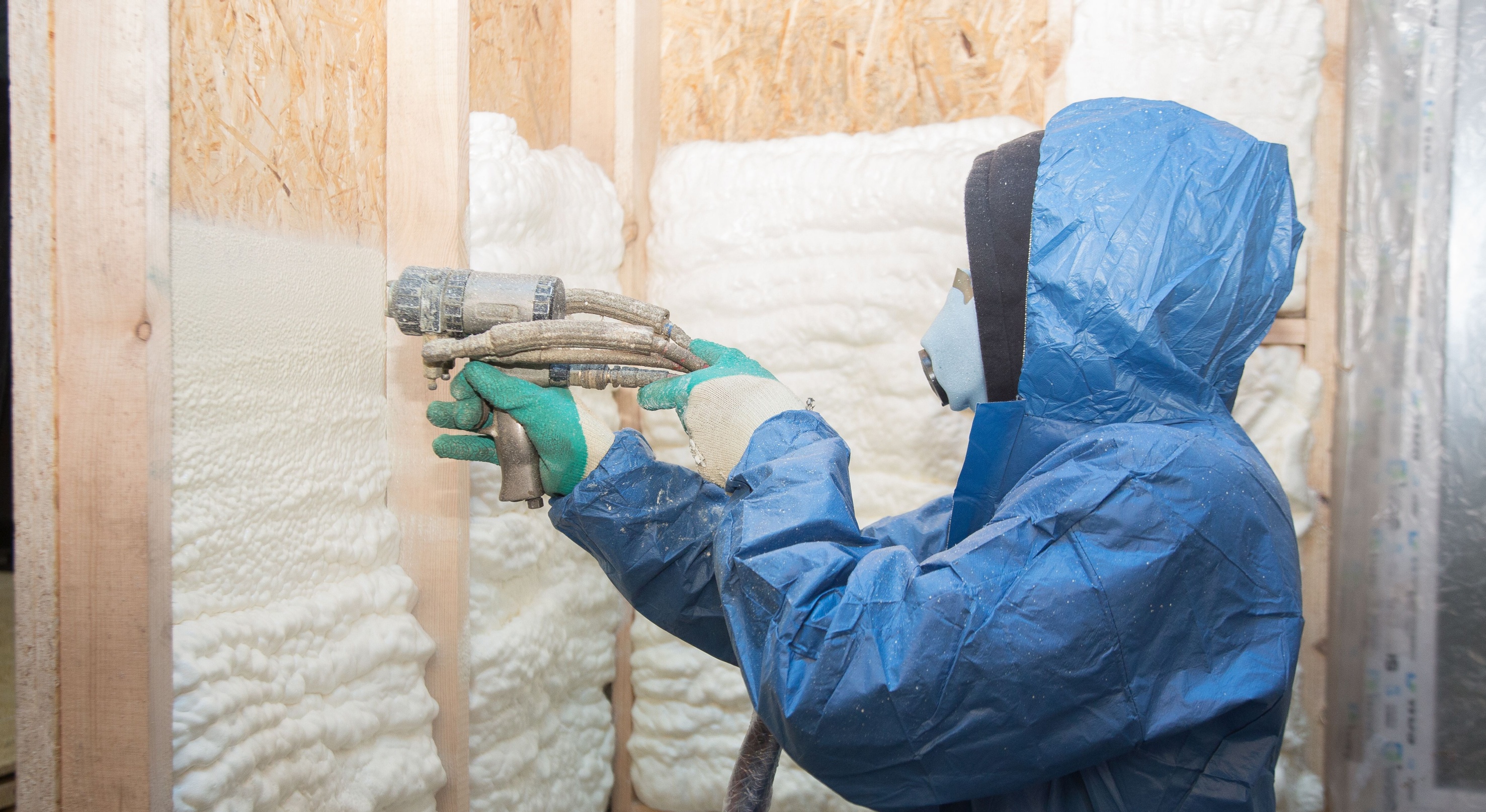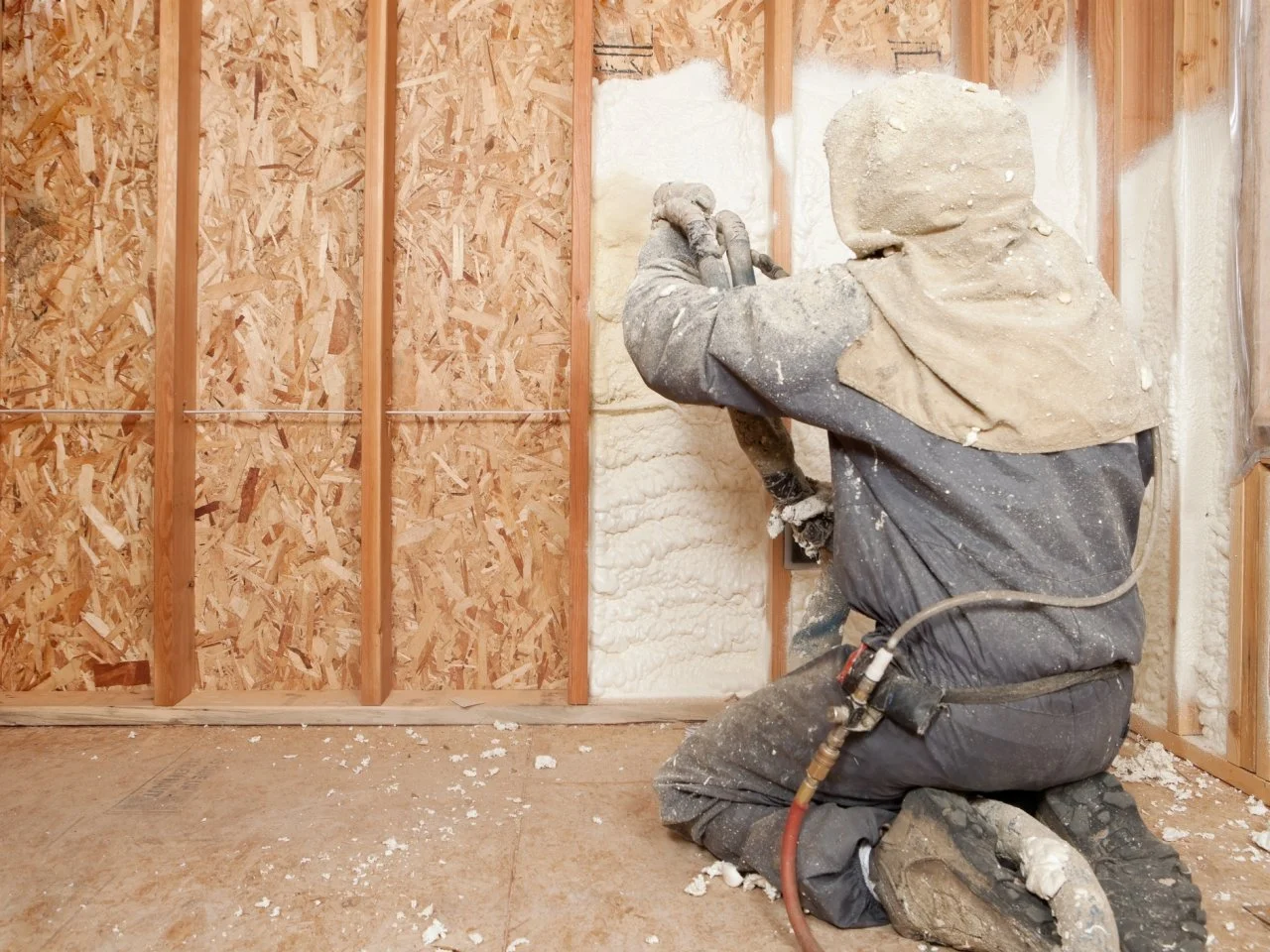How Spray Foam Can Improve Energy Efficiency in Your Home
How Spray Foam Can Improve Energy Efficiency in Your Home
Blog Article
Spray Foam: The Ultimate Remedy for Air Sealing and Insulation
Spray foam insulation has emerged as a leading solution for efficient air sealing and thermal insulation, using an one-of-a-kind combination of residential properties that establish it apart from standard methods. Understanding the full extent of its benefits, setup processes, and comparisons with other insulation kinds is vital for making notified decisions.
What Is Spray Foam?
Spray foam is a functional insulation material that combines the concepts of air sealing and thermal resistance to enhance power performance in buildings. Composed primarily of polyurethane or other comparable compounds, spray foam is used as a fluid that expands upon contact with surface areas, creating a solid, continuous layer of insulation. This unique residential or commercial property enables it to fill up voids, cracks, and spaces that traditional insulation materials might ignore, offering a remarkable air seal.
There are two primary kinds of spray foam: open-cell and closed-cell. Open-cell spray foam is lighter and much more flexible, offering exceptional sound absorption and a lower R-value per inch - Spray Foam. In contrast, closed-cell spray foam is denser, providing a greater R-value, dampness resistance, and added architectural honesty to developing components
The application process commonly entails specific devices, ensuring a smooth application that follows various substratums, including concrete, metal, and timber. This flexibility makes spray foam appropriate for both brand-new constructions and retrofitting existing structures. Its capability to create an impermeable barrier dramatically adds to minimizing energy intake and enhancing interior air top quality, thus making it a favored option among building contractors and property owners alike.
Advantages of Spray Foam Insulation
Among the most significant benefits of spray foam insulation is its remarkable ability to create a continual air obstacle, which effectively minimizes power loss. Unlike typical insulation materials, spray foam increases to fill up fractures and spaces, ensuring that air leakage is significantly decreased. This characteristic not just improves power performance however likewise causes reduce energy bills gradually.
Furthermore, spray foam insulation offers premium thermal resistance, adding to an extra secure interior setting. Its high R-value per inch permits for reliable insulation in restricted areas, making it ideal for attics, wall surfaces, and crawl spaces. The moisture-resistant buildings of spray foam aid stop mold and mildew and mildew development, promoting healthier living problems.
Another important benefit of spray foam insulation is its sound-dampening qualities (Spray Foam). It effectively lowers sound transmission between areas, creating a quieter and a lot more comfortable home environment. The durability of spray foam additionally stands apart, as it does not sag or clear up in time, maintaining its efficiency throughout its life expectancy
Exactly How Spray Foam Works
Understanding exactly how spray foam insulation functions is crucial for valuing its effectiveness in air securing and thermal resistance. Spray foam insulation consists of 2 key components: isocyanate and polyol material. When these components are combined, they undertake a chain reaction that causes the material to expand rapidly, producing a thick foam that fills up cracks, dental caries, and gaps.
As the foam broadens, it sticks to surface areas, creating a closed seal that considerably minimizes air seepage. This characteristic makes spray foam insulation extremely reliable at preventing drafts and wetness penetration, which can lead to power loss and damages in time. Furthermore, the closed-cell variation of spray foam uses exceptional thermal resistance because of its inflexible framework, successfully decreasing warm transfer.
The special residential properties of spray foam permit it to adapt uneven surface areas, guaranteeing comprehensive coverage and a seamless barrier. Therefore, spray foam insulation not just improves energy performance but also adds to improved indoor air high quality by lowering the accumulation of allergens and toxins. Eventually, understanding the technicians behind spray foam underscores its duty as an exceptional option for insulation and air securing check my source in both domestic and business applications.
Setup Process Review

Prior to setup, the room should be effectively cleaned and prepped, making sure that surface areas are complimentary from wetness, debris, and dust. Since pollutants can compromise adhesion and overall efficiency, this like it step is vital. Once the area is prepared, the application involves mixing the 2 elements of the spray foam, which expands upon call and fills up gaps effectively.
Trained experts must conduct the installment, utilizing customized devices to ensure consistent coverage and optimum density. Safety safety measures, consisting of using safety gear and ensuring correct air flow, are vital during this procedure. After application, the foam generally cures rapidly, developing a solid obstacle that improves power effectiveness.
Comparing Spray Foam to Conventional Insulation
When assessing insulation options, spray foam insulation stands out in contrast to typical products such as fiberglass and cellulose. Unlike fiberglass and cellulose, which can permit air seepage, spray foam broadens upon application, filling gaps and crevices to develop an impermeable seal.
In addition, spray foam gives a greater R-value per inch than standard insulation kinds, supplying more reliable thermal resistance in a thinner account. This characteristic is particularly beneficial precede with minimal dental caries deepness. In addition, spray foam is immune to dampness and mold and mildew growth, which can be a significant interest in cellulose and fiberglass, especially in damp environments.
Nevertheless, spray foam insulation commonly carries a higher upfront expense than its conventional counterparts. Home owners should consider this initial investment versus lasting power savings and efficiency advantages. Eventually, while both insulation types serve their purpose, spray foam emerges as a more sophisticated remedy for modern insulation demands, especially in terms of air sealing and thermal performance.

Verdict
In recap, spray foam insulation stands for a very effective remedy for accomplishing ideal air sealing and thermal resistance. Its unique residential or commercial properties, consisting of moisture resistance and sound dampening, make it appropriate for numerous applications in both new buildings and retrofitting projects (Spray Foam). The preliminary expenses might be greater contrasted to typical insulation products, the long-lasting advantages, such as considerable energy financial savings and boosted interior air quality, warrant the investment and highlight its value in contemporary building methods.
Spray foam insulation has emerged as a leading remedy for effective air sealing and thermal insulation, using an unique combination of properties that set it apart from traditional techniques.Spray foam is a versatile insulation product that integrates the concepts of air securing Recommended Reading and thermal resistance to improve energy performance in structures.When evaluating insulation alternatives, spray foam insulation stands out in contrast to conventional products such as fiberglass and cellulose. Ultimately, while both insulation kinds offer their purpose, spray foam arises as a much more innovative service for modern insulation requirements, particularly in terms of air securing and thermal performance.
In summary, spray foam insulation stands for a highly reliable option for achieving optimal air securing and thermal resistance.
Report this page